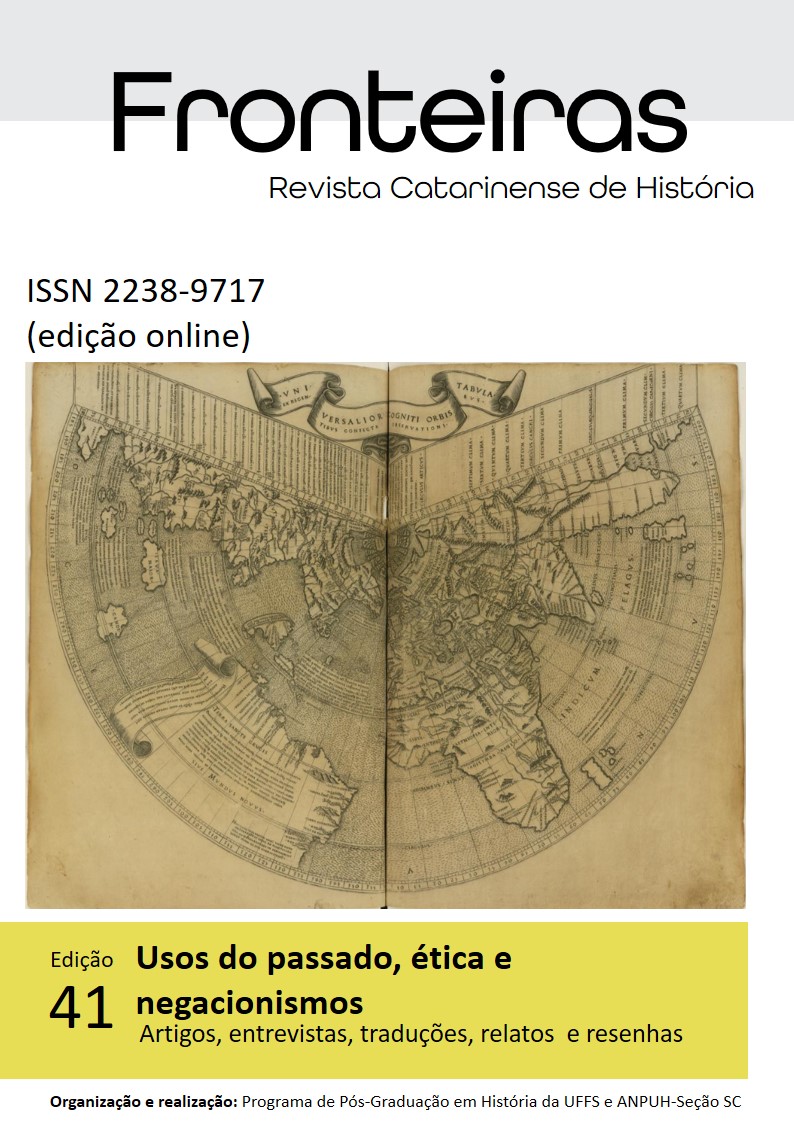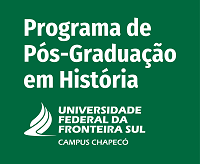A questão da verdade na historiografia após a Shoah
negacionismo, revisionismo e narrativismo
DOI:
https://doi.org/10.36661/2238-9717.2023n41.13150Palavras-chave:
Shoah, Verdade, Negacionismo, Revisionismo, NarrativismoResumo
O debate em torno da questão da verdade está, inevitavelmente, presente sempre que se discute o registro historiográfico. Mudanças em relação às categorias e noções que pautam tal debate foram consideradas ao longo do tempo. Neste artigo, destaco o período ulterior à Segunda Guerra Mundial como um momento de crise da historiografia e de abertura da história para os processos da memória, destacadamente o testemunho. Serão mobilizados os conceitos e discussões que acompanharam o negacionismo e o revisionismo da Shoah para, por fim, apresentar a contenda que acompanhou o chamado narrativismo de Hayden White como indício de uma alternativa para o fazer historiográfico contemporâneo.
Downloads
Referências
ANDERSON, Perry. On Emplotment: Two Kinds Of Ruin. In: FRIEDLÄNDER, Saul (Org). Probing the Limits of Representation: Nazism and the “Final Solution”. Cambridge; Massachusetts: Harvard University, 1992. p. 54-65.
ARENDT, Hannah. The Aftermath of Nazi Rule. Commentary, 10 October 1950. Disponível em: https://www.commentary.org/articles/hannah-arendt/the-aftermath-of-nazi-rulereport-from-germany/. Acesso em: 20 set. 2022.
ÁVILA, Arthur. Qual passado escolher? Uma discussão sobre o negacionismo histórico e o pluralismo historiográfico. Revista Brasileira de História, v. 41, n. 87, 2021, p. 161-184.
BARDÈCHE, Maurice. Nuremberg ou la Terre promisse. Paris: Les Sept Couleurs, 1948.
BARTOV, Omer. Murder in our Midst. The Holocaust, Industrial Killing and Representation. New York: Oxford University Press, 1996.
BEHRENS, Paul; TERRY, Nicholas; JENSEN, Olaf. Holocaust and Genocide Denial. A Contextual Perspective. New York: Routledge, 2017.
BEORN, Waitman Wade. Marching into Darkness: the Wehrmacht and the Holocaust in Belarus. Cambridge: Harvard University Press, 2014.
CUESTA BUSTILLO, Josefina. La memoria del horror, después de la II Guerra Mundial. Memoria e historia, n. 32, 1998, p. 81-104.
DAWIDOWICZ, Lucy. The War Against the Jews 1933-1945. New York: Penguin Books, 1975.
DES PRES, Terrence. The Survivor. An Anatomy Of Life In The Death Camps. New York: Oxford University Press, 1976.
EVANS, Richard. In Hitler’s Shadow: West German Historians and the attempt to escape from the Nazi past. New York: Pantheon Books, 1989.
FAURISSON, Robert. Écrits Révisionnistes (1974-1998). Edition privée hors-commerce, 1999.
FRIEDLÄNDER, Saul. A Conflict of Memories? The New German Debates about the “Final Solution”. New York: Leo Baeck Institute, 1987.
GINZBURG, Carlo. Just One Witness. In: FRIEDLÄNDER, Saul (Org.). Probing the Limits of Representation: Nazism and the “Final Solution”. Cambridge: Harvard University, 1992.
GINZBURG, Carlo. Relações de força: história, retórica, prova. São Paulo: Companhia das Letras, 2002.
HABERMAS, Jürgen. Eine Art Schadensabwicklung: Die apologetischen Tendenzen in der deutschen Zeitgeschichtsschreibung. Die Zeit, n. 29, 11 Juli 1986.
HARTOG, François. Evidência da História. O que os historiadores veem. Tradução de Guilherme João de Freitas Teixeira. Belo Horizonte: Autêntica, 2011.
HEER, Hannes. Killing Fields: The Wehrmacht and the Holocaust in Belorussia, 1941-1942. Holocaust and Genocide Studies, v.11 n. l, 1997, p. 79-101.
HILBERG, Raul. Perpetrators, Victims, Bystanders: The Jewish Catastrophe 1933-1945. New York: Aaron Asher Books, 1992.
HILLGRUBER, Andreas. No Questions are Forbidden To Research. In: PIPER, Ernst. Forever In The Shadow Of Hitler? Original Documents Of the Historikerstreit, The Controversy Concerning The Singularity Of The Holocaust. Atlantic Highlands: NJ Humanities Press, 1993.
HILLGRUBER, Andreas. Zweierlei Untergang: die Zerschlagung des Deutschen Reiches und das Ende des europäischen Judentums. Berlin: W.J. Siedler, 1986.
HIXENBAUGH, Mike; HYLTON, Antonia. Southlake school leader tells teachers to balance Holocaust books with “opposing” views, NBC News, New York, 14 oct 2021. Disponível em: https://www.nbcnews.com/news/us-news/southlake-texas-holocaust-books-schools-rcna2965. Acesso em: 14 ago 2022.
HUTTENBACH, Henry R. Mandating State Security: Keeping the Holocaust Hidden. Journal of Genocide Research, v. 5, n. 2, 2003, p. 309-311.
IADONISI, Rick. Bleeding History and Owning His [Father’s] Story: Maus and Collaborative Autobiography. CEA Critic, v. 57, n. 1, 1994, p. 41-56.
JENKINS, Keith. A História repensada. Tradução de Mario Vilela. São Paulo: Contexto, 2011.
LACAPRA, Dominick. History and Memory after Auschwitz. Ithaca: Cornell University Press, 1998.
LEVI, Primo. É isto um homem? Tradução de Luigi Del Re. Rio de Janeiro: Rocco, 1988.
LEVI, Primo. Os afogados e os sobreviventes. Tradução de Luiz Sérgio Henriques. Rio de Janeiro: Editora Paz e Terra, 2016.
LÉVY, Bernard-Henri. O espírito do judaísmo. Tradução de Bernardo Ajzenberg. São Paulo: Três Estrelas, 2018.
LIPSTADT, Deborah. History on Trial. My day in Court with David Irving. New York: Harper Collins Publishers, 2005.
LIPSTADT, Deborah. The Eichmann Trial. New York: Jewish Encounters, 2011.
LORENZ, Chris. Scientific Historiography. In: TUCKER, Aviezer. A Companion to the Philosophy of History and Historiography. Chichester: Blackwell Publishing, 2009.
LYOTARD, Jean-François. A condição pós-moderna. Tradução de Ricardo Corrêa Barbosa. Rio de Janeiro: Editora José Olympio, 2009.
MOSES, A. Dirk. Hayden White, Traumatic Nationalism, and the Public Role of History. History and Theory, n. 44, 2005, p. 311-332.
NOLTE, Ernst. Vergangenheit, die nicht vergehen will. Frankfurter Allgemeine Zeitung, 6. Juni 1986.
PAUL, Herman. Hayden White: The Historical Imagination. Cambridge: Polity Press, 2011.
POMIAN, Krzysztof. História e Ficção. Tradução de Marina Maluf. Proj. História. São Paulo, 26, 2003.
RANKE, Leopold von. Geschichten der romanischen und germanischen Völker von 1494 bis 1514: Zur Kritik neuerer Geschichtsschreiber. Leipzig: Sämmtliche Werke, 1874.
ROUDINESCO, Elisabeth. Retorno à questão judaica. Tradução de Claudia Berliner. Rio de Janeiro: Zahar, 2010.
ROUSSO, Henry. Le syndrome de Vichy, de 1944 à nos jours. Paris: Points Seuil, 1987.
SANTNER, Eric. L. History beyond the Pleasure Principle: Some Thoughts on the Representation of Trauma. In: FRIEDLÄNDER, Saul (Ed). Probing the Limits of Representation: Nazism and the “Final Solution”. Massachusetts: Harvard University Press, 1992. p. 143-154.
SCHOLTZ, Gunter. O problema do historicismo e as ciências do espírito no século XX. História da Historiografia: International Journal of Theory and History of Historiography, Ouro Preto, v. 4, n. 6, 2011, p. 42-63.
SHERMER, Michael; GROBMAN, Alex. Who says the Holocaust never happened and why do they say it? Berkeley: University of California Press, 2009.
SPIEGELMAN, Art. A Problem of Taxonomy. New York Times, New York, 29 dez. 1991. Disponível em: https://www.nytimes.com/1991/12/29/books/l-a-problem-of-taxonomy-37092.html. Acesso em: 13 out. 2021.
SPIEGELMAN, Art. Maus: a história de um sobrevivente. Tradução de Antonio de Macedo Soares. São Paulo: Companhia das Letras, 2009.
VIDAL-NAQUET, Pierre. Lettre. In: GIARD, Luce (Ed). Michel de Certeau. Paris: Centre Georges Pompidou, 1987, p. 71-74.
VIDAL-NAQUET, Pierre. Os assassinos da memória: “Um Eichmann de papel” e outros ensaios sobre o revisionismo. Tradução de Marina Appenzeller. São Paulo: Papirus, 1988.
WHITE, Hayden. Historical Emplotment and the Problem of Truth. In: FRIEDLÄNDER, Saul (Org.). Probing the Limits of Representation: Nazism and the “Final Solution”. Cambridge: Harvard University, 1992. p. 37-53.
WHITE, Hayden. The content of the form: narrative discourse and historical representation. Baltimore: The John Hopkins University Press, 1987.
WHITE, Hayden. The Modernist Event. In: SOBCHACK, Vivian. The persistence of history: cinema, television, and the modern event. New York: Routledge, 1996.
YITZHAK, Arad. Belzec, Sobibor, Treblinka: The Operation Reinhard Death Camps. Bloomington: Indiana University Press, 1987.



















